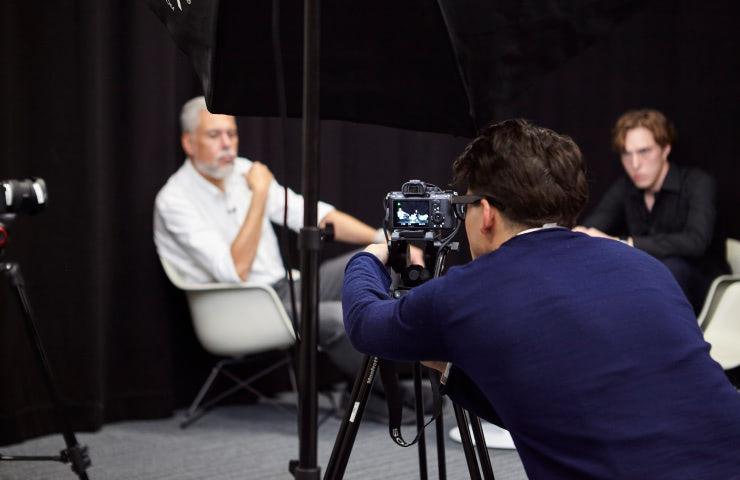18/12/2023
Passionate about helping leaders understand the power of narratives, Mimi Kalinda is a multilingual writer, coach, educator and innovative professional. Her 26 years of experience serve as an invaluable asset in the marketing, communication and sales programs at IE University. Mimi recently sat down with us to share her story and explain why storytelling is important for entrepreneurs today.
Mimi Kalinda is a passionate storyteller with a strong drive to make a lasting impact. Originally from the Democratic Republic of Congo (DRC) and Rwanda, her parents’ jobs allowed them to live in many different places. A large part of her life was spent in South Africa, however, which she describes as an exciting place to grow up. From Africa, Belgium and Portugal to London and New York, Mimi has experienced the world and has many stories to tell.
The start of a game-changing Marketing, Communication & Sales career
Feeling young, fabulous and inspired by the limelight, Mimi started her career in front of the camera. Professionally speaking, she has always worked in media in one form or another. After many years of telling stories to the camera, Mimi moved to London to work for MTV, excited to get a feel of what happens behind the scenes. She began producing and presenting her own shows and mastered the necessary elements of stories that would entertain, educate and make an impact.
Though it was an incredible learning experience, Mimi was ready for the next step. So she packed her bags and headed to South Africia to start law school. But in her third year, MTV reached out with another job offer. “I had to make a decision about whether I really wanted to be a lawyer or to pursue media,” she says.

“I knew I’d be a terrible lawyer, so I switched paths to work for MTV.” She later left MTV to head to New York to earn a degree in media studies at New York University.
During her time in New York working and studying, Mimi went fully behind the scenes. She’s held various roles at HBO, Showtime, Lifetime and Oprah’s channel Oxygen—all resulting in opportunities to meet big names and take classes from powerful players in the film industry. One of her favorite teachers was director Spike Lee, with whom she struck up a mentorship, before joining 40 Acres and a Mule Filmworks, his iconic production company.
On a quest to reshape the narrative
Working with Spike Lee marked a turning point in Mimi’s professional career. She was involved in a number of his films throughout her time with his company. She also continued working independently, specifically a documentary on a topic she’s incredibly passionate about: how American audiences perceive people in Africa through the news and media, which in turn, affects the self-esteem and self-image of Africans living in the states. It was shown in a few film festivals and won several awards.
Mimi then relocated to the DRC, where she worked with a small team of independent filmmakers on a USAID grant. There, she was introduced to the Sabido methodology, which is essentially Behavior Change Communication (BCC) using programs and long-format content like television series.
In the DRC, her two main goals were to tackle the stigmatization of living with HIV and AIDS and to draw attention to the problem of violence against women in times of war. Mimi and her team worked with popular singers to raise awareness of these vital topics. Once the campaign was over, she headed back to South Africa, where public relations fell right into her lap.
Ready to make an impact in a new way, Mimi started her new role at Weber Shandwick, a global PR company. She led their social impact practice before deciding to found her own company, Africa Communications Media Group, which would focus on public relations and telling stories in Africa. Her clients are people who want to gain insight into the continent and use storytelling to get their message across. Soon after, she founded her second company: Storytelling and Leadership. She notes, “I work with leaders from all walks of life. The goal is to help them understand the power of personal narratives and organizational narratives too.”
“Storytelling is the art of persuasion, which is an essential part of marketing, sales and communications.”

Storytelling comes to Marketing, Communication & Sales
To Mimi, stories are the foundation of our world, an idea she wants to spread to innovative young professionals. As a result, she is now one of IE University’s top faculty. She teaches a class called Storytelling and Public Speaking, where a lot of learning revolves around neurochemistry, the science of storytelling. It helps students master the art of persuasion and how to tell stories that make audiences feel things, like empathy, for example. “When you think about advertising, they tell stories with specific objectives,” she adds. “In class, look at how to build a specific idea into a narrative that someone buys into.”
The class is complemented by lessons on public speaking. “Now that students understand how to tell a great story for strategic objectives, they have to go on and tell that story.” This portion of the class covers techniques and tools that great speakers use to evoke emotion. “President Obama, for example, uses his hands to speak. He also never uses his own name but puts everything in a relatable story that makes you feel emotional about a subject.”
Storytelling is crucial in the world of marketing, communication and sales. At IE University’ it’s an essential part of the transversal Common Core period within the range of MARCOM programs. As she explains,

“If I had to define my class, it’s about sales. How do you persuade people to do something? How do you reach into their emotions?”
Students will gain confidence in their ability to talk to people. The first step, according to Mimi, is to understand that sometimes public speaking doesn’t come naturally. Students can learn the tools and techniques required to captivate and persuade their audience with confidence. With the rise of artificial intelligence and access to data and insights, public relations is transforming. However, the human element of creativity and communication is incredibly important, especially critical thinking and problem-solving skills—areas covered in Mimi’s class.
Shaping stories for a data-driven world
For students who are curious why storytelling is necessary in today’s fast-paced market, Mimi would say this: “If you are going to be building a career in which you sell anything—whether that thing is a product or service or even your skill—you need to learn how to tell impactful stories. In any job you get, you’ll be constantly trying to persuade people to see your point of view, and constantly telling purposeful stories with a strategic end in mind.”








